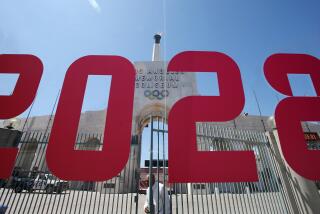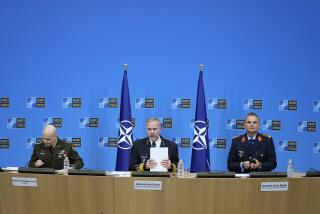Britain to add troops to Summer Olympic Games security plan
Britain will assign as many as 13,500 troops to help secure next year’s Summer Olympics on home soil, a military presence larger than the country’s deployment in Afghanistan.
The troops are to provide backup for police and to help protect venues before and during the two-week global sporting event in July in London, which Defense Secretary Philip Hammond on Thursday called “the biggest security challenge this country has faced for decades.”
The military contingent will be part of a massive security detail that has ballooned in cost from about $440 million to nearly $863 million. That has led to warnings that taxpayers could shell out more than the $14.5 billion budgeted as the government’s contribution to hosting the Summer Games, at a time when residents are steeling themselves for drastic cuts in social spending.
But there may be little choice with the Olympics just seven months away.
Word leaked out last month that an official review of security arrangements had scoffed at the Olympic organizing committee’s original plan to hire 10,000 private guards as wildly inadequate. At least twice that many would be necessary to supplement police in patrolling the athletes’ village, conducting bag checks and implementing other security measures at competition venues spread across London.
Moreover, U.S. officials were said by the Guardian newspaper to be so unhappy about the British arrangements that they were preparing to send 1,000 security personnel, including 500 FBI agents, to London to help keep American athletes and diplomats safe during the Games.
Britain’s Ministry of Defense said Thursday that as many as 7,500 troops will be assigned to sporting venues to assist in establishing “airport-style” security. An additional 5,000 service personnel will back up London’s Metropolitan Police Service, also known as Scotland Yard, particularly in the event of a civil emergency. The remaining 1,000 troops will provide logistical support.
Bomb-disposal units, military dogs, helicopters and fighter jets are to be made available, and the British battleship Ocean, the biggest in the Royal Navy’s fleet, will be moored in the Thames at Greenwich, in South London.
“It’s a significant commitment,” Hammond told reporters. The troops “will add resilience and robustness to what will be a civilian-led operation.”
In addition, it emerged last month that the military will deploy surface-to-air missiles to maintain an “air exclusion zone” over the Olympic venues.
The anticipated cost of the 2012 Summer Games has been a subject of controversy since London won the hosting rights in 2005. Critics said the Olympics would increase local taxes for residents and saddle the city with a number of abandoned stadiums, but supporters call it a good investment that will help revitalize neglected parts of East London.
No one foresaw the global recession that hit a few years later or the sweeping austerity plan approved last year by the new Conservative-led government. Olympic organizers say they are now pinching their pennies as best they can.
“We will be living hand-to-mouth between now and the Olympic Games,” Sebastian Coe, the gold medal-winning runner who heads the organizing committee, said this month. “These are the hard months that everybody was predicting six years ago.
“We’ve raised record sums of money in the most toxic of environments that any Games [have] actually been delivered in. We continue to do that. But this will be tough.”
More to Read
Start your day right
Sign up for Essential California for news, features and recommendations from the L.A. Times and beyond in your inbox six days a week.
You may occasionally receive promotional content from the Los Angeles Times.







